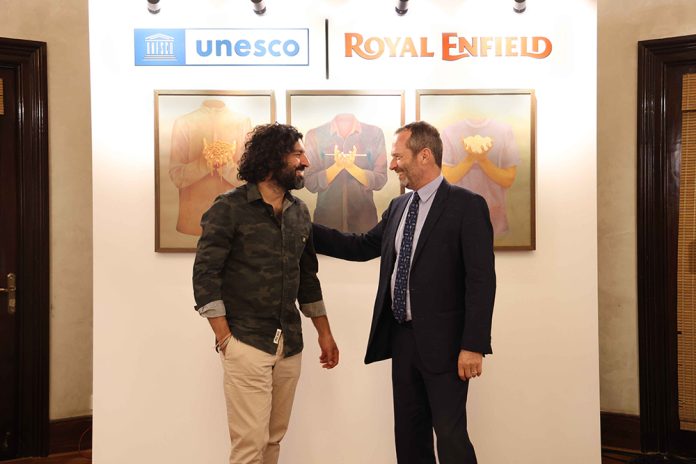
UNESCO and Royal Enfield forge a unique partnership to safeguard the Intangible Cultural Heritage of India
Delhi, 23 August 2022: In a first of its kind endeavour, UNESCO (the United Nations Educational, Scientific and Cultural Organisation) and Royal Enfield, the world’s oldest motorcycle brand in continuous production since 1901, have come together in a unique partnership to promote and safeguard the Intangible Cultural Heritage of India, beginning with the Himalayas.
The announcement of this unique partnership between UNESCO and Royal Enfield is being done during a four-day creative showcase at the iconic Bikaner House in Delhi, curated by Dr Monisha Ahmed and Mary Therese Kurkalang. The programme is curated as an experiential and creative showcase of the Intangible Cultural Heritage (ICH) practices in the Western Himalayas and the North Eastern region. This includes an exhibition, panel discussions, film screenings, performances and lecture-demonstrations. The four-day programme features eminent artists, designers, chefs, mixologists, musicians, actors, photographers and luminaries of the social development sector such as Adil Hussain, Peter D’Ascoli, Sonam Dubal, Rita Banerji, Mallika Virdi and Tsewang Namgail, Yangdup Lama, Nilza Wangmo and Anumitra Ghosh.
As part of its ongoing programme globally and in India, UNESCO has been spearheading the movement to identify, document and preserve the Intangible Cultural Heritage of India, which is one of the 178 countries to have adopted the 2003 UNESCO Convention for the Safeguarding of the Intangible Cultural Heritage (ICH), for decades. Apart from its incredible heritage of monuments, a substantial part of India’s cultural heritage consists of an extraordinarily dynamic array of living heritage. This includes traditions of music, dance, theatre, storytelling, festivals, and rituals.
Intangible cultural heritage is directly linked to livelihoods. For instance, large numbers of women in rural India are engaged in weaving and the production of handicrafts, and India’s handloom and crafts sector have emerged as one of the country’s largest employers and facilitators for income generation in rural areas.
Talking about the vast tangible and intangible heritage of India, Eric Falt, Director and UNESCO Representative to Bhutan, India, Maldives and Sri Lanka said, “The wealth of India’s living heritage remains largely untapped, and the task of recognising and preserving it is something that should be shouldered by all stakeholders, including the private sector. It is a matter of pride for UNESCO to partner with Royal Enfield Motorcycles, as we come together to promote and preserve the Intangible Cultural Heritage of the Himalayas. I hope this will inspire people to support sustainable, respectful travel.”
Indeed, the 2030 Agenda for Sustainable Development recognizes that culture can contribute to economic growth, sustainable consumption and production, and the growth of sustainable settlements. Today, 14 elements from India are inscribed on UNESCO’s Representative List of the Intangible Cultural Heritage of Humanity.
Commenting on the partnership, Siddhartha Lal, Managing Director and Chief Executive Officer of Eicher Motors said, “The Himalayas is the spiritual home for Royal Enfield and we are very excited to partner with UNESCO to work towards building a sustainable future for this region. With more members of our motorcycling community heading there, Royal Enfield is working in this iconic landscape to promote sustainable tourism and build resilient communities. Through this partnership, we aim to preserve and promote the culture, knowledge and traditions that are harmonious with fair and regenerative living and ensure that Himalayan communities are empowered to make decisions that support their resilience.”
Given its long relationship with the Himalayas, stretching back over three decades, Royal Enfield’s ambition is to partner with 100 Himalayan communities to adopt sustainable living practices, by 2030. Over the years, Royal Enfield has played a leading role in galvanising communities and bringing them closer to the Himalayas. The brand now aims to enable 1 million members of its global motorcycling community to act as agents of change and to take action to help regenerate iconic landscapes like the Himalayas and the communities within them.
Royal Enfield already has several projects in the Himalayas that aim to promote sustainable living practices and empower communities to grow and develop, including waste collection centres and women’s cooperatives. Additionally, Royal Enfield organises several cause-based rides where the riding community is encouraged to engage with local communities through causes such as clean up drives, tree planting and so on.





